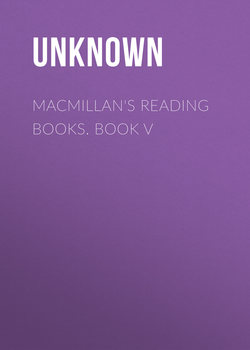Читать книгу Macmillan's Reading Books. Book V - Unknown - Страница 1
На сайте Литреса книга снята с продажи.
PREFACE TO BOOK V
ОглавлениеThis seems a fitting place in which to explain the general aim of this series of Reading Books. Primarily, it is intended to provide a systematic course for use in schools which are under State inspection; and, with this view, each Book in the series, after the Primer, is drawn up so as to meet the requirements, as set forth in the English and Scotch codes issued by the Committees of Council on Education, of the Standard to which it corresponds.
This special adaptation will not, it is hoped, render the series less useful in other schools. The graduated arrangement of the books, although, perhaps, one to which every teacher may not choose to conform, may yet serve as a test by which to compare the attainments of the pupils in any particular school with those which, according to the codes, may be taken as the average expected from the pupils in schools where the Standard examination is, necessarily, enforced.
The general character of the series is literary, and not technical. Scientific extracts have been avoided. The teaching of special subjects is separately recognised by the codes, and provided for by the numerous special handbooks which have been published. The separation of the reading class from such teaching will prove a gain to both. The former must aim chiefly at giving to the pupils the power of accurate, and, if possible, apt and skilful expression; at cultivating in them a good literary taste, and at arousing a desire of further reading. All this, it is believed, can best be done where no special or technical information has to be extracted from the passages read.
In the earlier Books the subject, the language, and the moral are all as direct and simple as possible. As they advance, the language becomes rather more intricate, because a studied simplicity, when detected by the pupil, repels rather than attracts him. The subjects are more miscellaneous; but still, as far as possible, kept to those which can appeal to the minds of scholars of eleven or twelve years of age, without either calling for, or encouraging, precocity. In Books II., III., and IV., a few old ballads and other pieces have been purposely introduced; as nothing so readily expands the mind and lifts it out of habitual and sluggish modes of thought, as forcing upon the attention the expressions and the thoughts of an entirely different time.
The last, or Sixth Book, may be thought too advanced for its purpose. But, in the first place, many of the pieces given in it, though selected for their special excellence, do not involve any special difficulties; and, in the second place, it will be seen that the requirements of the English Code of 1875 in the Sixth Standard really correspond in some degree to those of the special subject of English literature, formerly recognised by the English, and still recognised by the Scotch Code. Besides this, the Sixth Book is intended to supply the needs of pupil teachers and of higher classes; and to be of interest enough to be read by the scholar out of school-hours, perhaps even after school is done with altogether. To such it may supply the bare outlines of English literature; and may, at least, introduce them to the best English authors. The aim of all the extracts in the book may not be fully caught, as their beauty certainly cannot be fully appreciated, by youths; but they may, at least, serve the purpose of all education—that of stimulating the pupil to know more.
The editor has to return his thanks for the kindness by which certain extracts have been placed at his disposal by the following authors and publishers:—Mr. Ruskin and Mr. William Allingham; Mr. Nimmo (for extract from Hugh Miller's works); Mr. Nelson (for poems by Mr. and Mrs. Howitt); Messrs. Edmonston and Douglas (for extract from Dasent's "Tales from the Norse"); Messrs. Chapman and Hall (for extracts from the works of Charles Dickens and Mr. Carlyle); Messrs. Longmans, Green, and Co. (for extracts from the works of Macaulay and Mr. Froude); Messrs. Routledge and Co. (for extracts from Miss Martineau's works); Mr. Murray (for extracts from the works of Dean Stanley); and many others.
